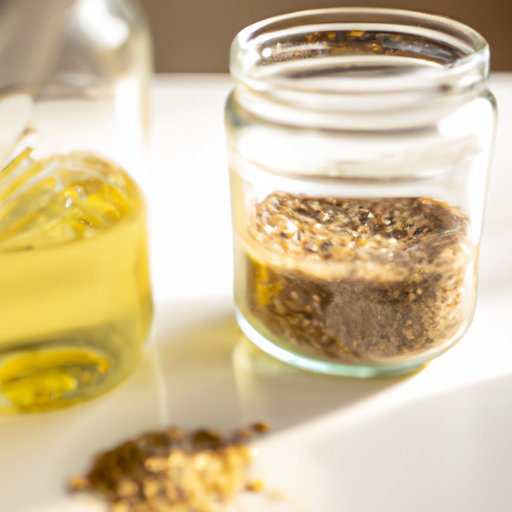I. Introduction
Many of us have experienced stomach gas, which can be uncomfortable and sometimes downright painful. Gas occurs when we swallow air while eating, drinking, or even speaking. It can also form when food breaks down in the digestive system. Fortunately, there are home remedies that can help relieve gas symptoms. In this article, we will discuss some of the most popular remedies that can be easily done at home.
II. Herbal Teas
Herbal teas have been used for centuries to aid in digestion and provide relief from gas symptoms. Two of the most commonly used teas are peppermint and ginger tea.
A. Peppermint Tea
Peppermint tea contains menthol, which can help relax the muscles in the digestive tract. To make peppermint tea, put a teaspoon of dried peppermint leaves or a peppermint tea bag in a cup of hot water. Let it steep for 10-15 minutes before drinking it. You can drink peppermint tea up to three times a day.
B. Ginger Tea
Ginger has anti-inflammatory properties that can help reduce the inflammation in the digestive tract. To make ginger tea, put a teaspoon of freshly grated ginger in a cup of hot water. Let it steep for 10-15 minutes before drinking it. You can drink ginger tea up to three times a day.
C. Recommended Consumption
You can drink these herbal teas before meals or when you are experiencing gas symptoms. It is best to drink them when they are warm.
III. Yoga Positions
Yoga is an ancient practice that has been found to be effective in reducing gas symptoms. Two yoga positions that can be helpful are the wind-relieving pose and downward-facing dog.
A. Wind-Relieving Pose
For the wind-relieving pose, lie flat on your back and draw your knees to your chest. Wrap your arms around your knees and gently rock from side to side. Hold the pose for 10-15 breaths before releasing. Repeat the pose as necessary.
B. Downward-Facing Dog
Downward-facing dog is a pose that can help stimulate digestion. Begin on your hands and knees with your hands shoulder-width apart and your knees hip-width apart. Tuck your toes under and lift your hips up, straightening your arms and legs. Hold the pose for 5-10 breaths before releasing.
IV. Elimination Diet
Elimination diets are used to determine which foods may be causing gas symptoms. During the elimination diet, you will eliminate certain foods from your diet and then slowly reintroduce them to see if they cause any symptoms. Some foods to avoid during the elimination diet include:
A. Foods to Avoid
- Beans
- Onions
- Broccoli
B. Alternative Options
Some alternative options during an elimination diet include leafy greens, bananas, and pineapple. These foods are low in fermentable carbohydrates and should not cause gas symptoms.
V. Apple Cider Vinegar
Apple cider vinegar has been found to be effective in reducing gas symptoms. It can help promote the production of stomach acid, which can aid in digestion. To consume apple cider vinegar, mix one tablespoon of apple cider vinegar with a glass of water. Drink the mixture before meals.
VI. Fennel Seeds
Fennel seeds have been used for centuries to aid in digestion and relieve gas symptoms. They contain anethole, which can help relax the muscles in the digestive tract. To consume fennel seeds, chew on a teaspoon of seeds after meals.
VII. Massages
Massages can help relieve gas symptoms by stimulating the digestive tract and helping to release trapped gas. A massage can also help reduce stress and promote relaxation. A suggested massage technique is to rub your stomach in a circular motion for several minutes.
VIII. Drink More Water
Drinking more water can help flush out the digestive system and reduce gas symptoms. It is recommended to drink at least eight glasses of water per day.
A. Suggested Amount of Water Consumption
It is important to drink water throughout the day, especially before and after meals. Drinking water with meals can dilute stomach acid, which can slow down digestion.
IX. Conclusion
Gas symptoms can be uncomfortable and can interfere with daily activities. Fortunately, there are several home remedies that can help relieve gas symptoms. Herbal teas, yoga positions, an elimination diet, apple cider vinegar, fennel seeds, massages, and drinking more water are all effective methods for reducing gas symptoms. Incorporating these remedies into a daily routine can lead to better digestive health and a more comfortable life.
Encouragement for a healthy lifestyle: incorporate these home remedies into a healthy lifestyle that includes a well-balanced diet and regular exercise. If gas symptoms persist or become increasingly bothersome, it is recommended to speak with a healthcare provider.
Final thoughts: gas symptoms can be uncomfortable, but they do not have to be a source of constant discomfort. With a little bit of effort and the incorporation of home remedies, gas symptoms can be reduced or eliminated altogether.
